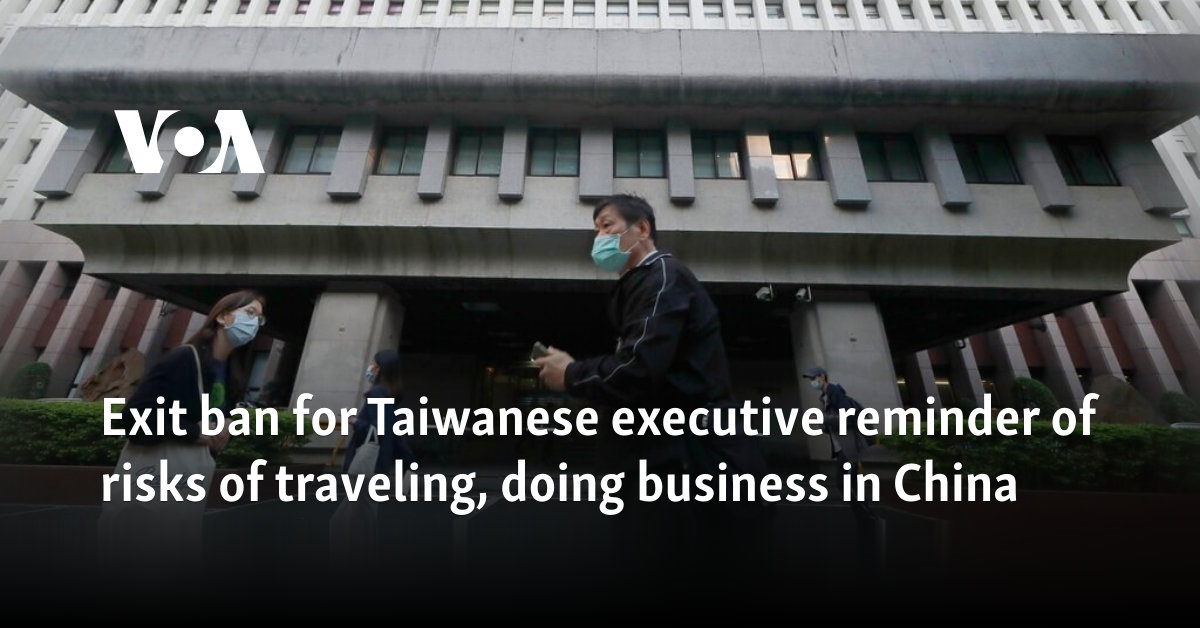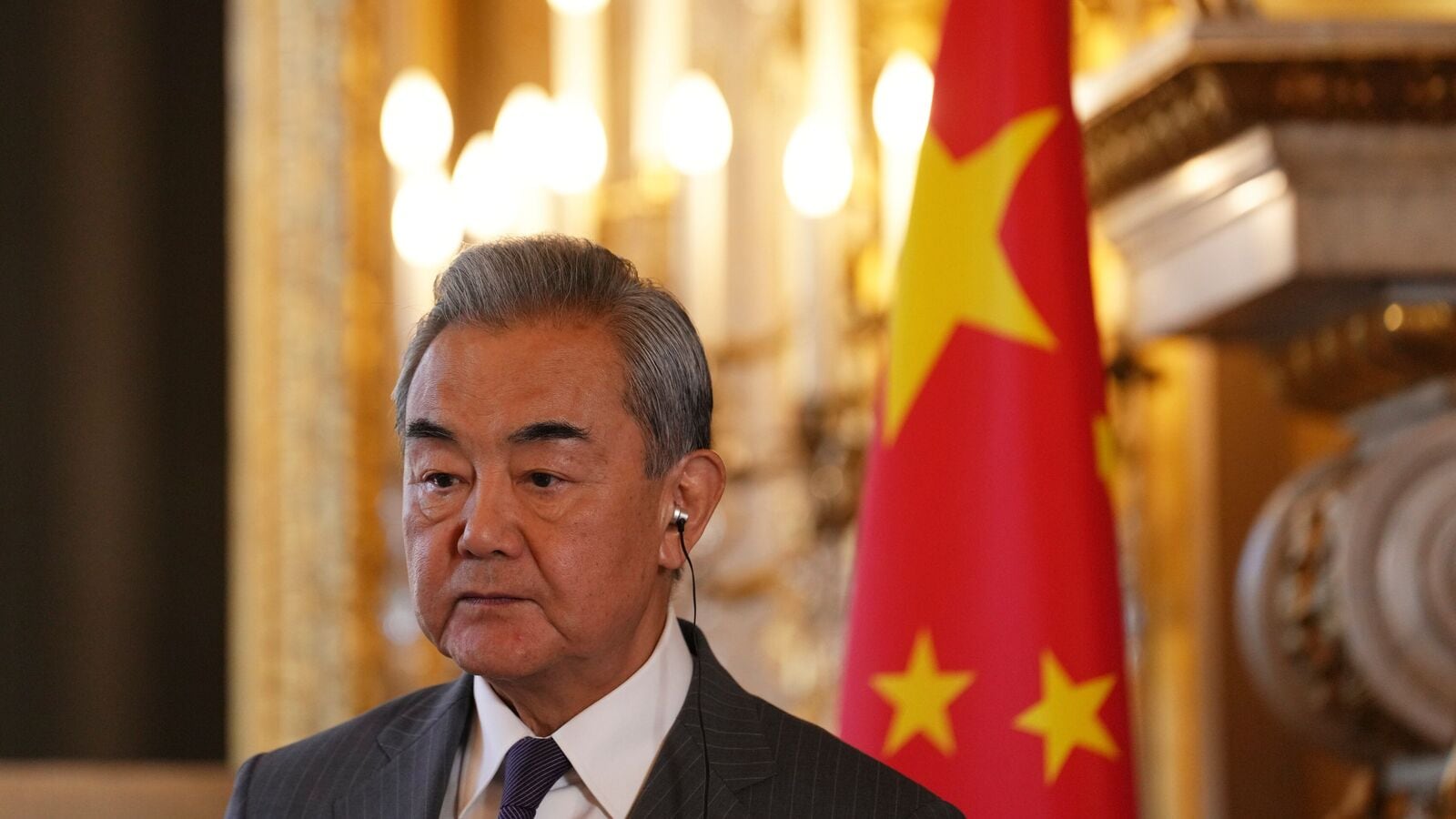Taiwan authorities’ confirmation that a senior executive from a major Taiwanese industrial group has been banned from leaving China is raising concerns about the risks of traveling and doing business there, analysts say.
The case comes amid heightened tensions between Beijing and Taipei and as a number of foreigners have been refused permission to leave China.
Taiwan’s Mainland Affairs Council, or MAC, which is in charge of relations with China, confirmed Wednesday that an unidentified senior executive from Formosa Plastics Group was interrogated by local authorities after landing in the Chinese commercial capital Shanghai from Taipei on September 1.
The MAC initially declined to share any details due to personal safety reasons. But late Thursday, the council said the exit ban imposed on the Taiwanese executive is likely the result of a criminal offense rather than a political or national security case.
On Thursday, the Formosa Plastic Group said they were trying to gather more information about the case and that the senior executive is “safe, free to move around, and cooperating with the Chinese authorities’ investigation.”
“We will continue to follow his case and provide the necessary assistance,” the company said in a statement.
Political pressure
Analysts say that while details are still forthcoming, the case does seem similar to other instances where Beijing has used political means to pressure Taiwanese or foreign businesses.
“This case reminds me of the Chinese government’s tax probe into Taiwanese tech giant Foxconn last October, which coincided with the company’s founder Terry Gou’s bid to run in Taiwan’s presidential election,” said Chen Fang-yu, a political scientist at Soochow University in Taiwan.
At the time, Taiwan’s former national security chief Wellington Koo said there was a “political aspect” in Beijing’s tax probe against Foxconn. Gou eventually dropped out of the presidential election last November.
Chen told VOA that it remains unclear what the Chinese government might be seeking in this case since no more details have been provided by authorities on either side.
“However, it’s clear that other Taiwanese or foreign companies have faced similar situations before,” he said.
Other experts say the case could have a chilling effect within Taiwan’s business community and exacerbate Taiwanese businesses’ exodus from China.
“While some Taiwanese businesses have started to reduce the scale of their operations in China several years ago, this case will push more companies to exit the Chinese market as a way to protect their interests,” Wang Kuo-chen, an economist at the Chung-Hua Institute for Economic Research, told VOA by phone.
‘Taiwan independence forces’ crackdown
Meanwhile, a 22-year-old Taiwanese man surnamed Kuo went missing in China after arriving in Shanghai on August 27, prompting his family to seek help from the Taiwanese government.
During Thursday’s regular briefing, the Mainland Affairs Council’s spokesperson Liang Wen-chieh said Kuo had been traveling in China with friends. Taiwan’s Straits Exchange Foundation has also contacted its Chinese counterparts to seek more information about Kuo’s whereabouts.
On September 6, China’s Taiwan Affairs Office, which manages cross-strait exchanges, said a court in China’s eastern city of Wenzhou had sentenced Taiwanese political activist Yang Chih-yuan to nine years in jail under secession charges.
In June, Beijing introduced 22 new guidelines to punish what they called “die-hard Taiwan independence activists” and the maximum punishment is the death sentence.
Wu Se-chih, an assistant professor at the Taipei University of Marine Technology, told VOA that these developments reflect Beijing’s enhanced focus on national security and that the strict measures are likely to have a ripple effect.
“The more stringent inspection of the content on Taiwanese people’s electronic devices at Chinese airports, the sentencing of Yang under secession charges, and the disappearance of Kuo will cause more Taiwanese people to re-evaluate the potential risks they might face when traveling to China,” Wu told VOA in a telephone interview.
Asked about the recent developments, Liu Pengyu, the spokesperson of the Chinese Embassy in Washington, said, “China is a country ruled by law and liberty is respected and protected in the country.”
Exit bans
In addition to Taiwanese people, foreign nationals from other countries have also faced difficulty leaving China.
According to the Duihua Foundation in California, which focuses on freeing detainees through dialogue with China, around 200 Americans are held under coercive measures in the country, and more than 30 Americans are banned from leaving the country.
At least 17 Japanese citizens have been detained on spying charges since China enacted its anti-espionage law in 2015 and at least five of them remain in Chinese detention as of November 2023.
John Kamm, the executive director of the Duihua Foundation, told VOA that Beijing has intensified the use of coercive measures against foreign nationals since Chinese President Xi Jinping came to power in 2012.
In his view, the growing number of foreigners detained under espionage charges has led to a drop in the number of tourists and foreigners traveling to China.
“China’s use of coercive measures and the imposition of exit bans on foreign nationals has damaged China’s image and that feeds into the drop in foreign direct investment and the drop in tourist arrivals in the country,” Kamm said in a phone interview.
Despite Beijing’s efforts to attract more foreign investment, Wu in Taiwan said it’s unlikely that the Chinese government will ease up its efforts to safeguard national security, which he said remains a priority for the Chinese Communist Party.
“Beijing still prioritizes politics over economy, so at a time when their economic policies haven’t proved to be effective, I expect the Chinese government to keep doubling down on the importance of safeguarding national security,” he told VOA.

